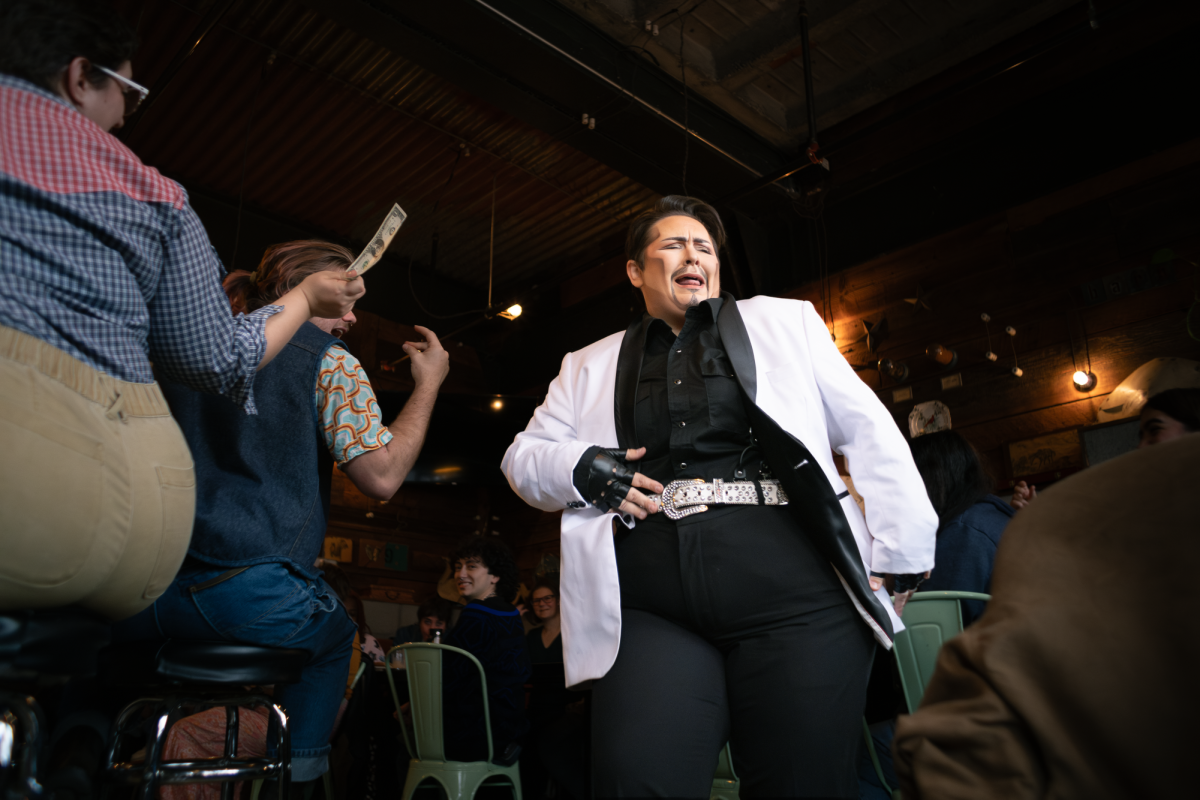Staring at the sun’s beams reflecting off the Willamette River, I only wished to jump into the cool water. The sound of laughter from surrounding parties and the smell of sunscreen felt like an invitation to summer. All I wanted to do was get in — but something held me back.
For most, swimming in the water was as simple as getting in — sure the water was cold, but it was refreshing to escape the thick, hot Oregon summer air. But things aren’t as straightforward when your existence on the planet is politicized by a system you never asked to be a part of.
Baggy clothing served as my armor. The act of taking off my clothes to reveal my body in such a vulnerable way — a swimsuit — felt like dropping my weapons in battle. Then again, growing up socialized as a girl in the suburbs of Arizona was a battle. Public school taught me nothing except that kids were mean and they could tell I was different from them just as well as I could.
I talked like a girl and looked like a girl — but I never felt like a girl. Now as an adult, I know I never was a girl. Instead, I have found my place in the world through my existence as a gender-nonconforming person. While this revelation has made me feel more comfortable in the world, it appears to have the opposite effect on some.
Over 500 pieces of anti-trans legislation have been introduced in the U.S. in 2023 alone, and as of July, 80 of them have already been passed into law. The fear that exists within trans and nonbinary Americans’ lives intensifies daily as more and more legislation is used to police people’s bodies, bathroom use and more.
Even teachers’ use of students’ preferred names and pronouns is being addressed. One Montana bill that passed this year states it is “not an unlawful discriminatory practice” to deadname or misgender a student. According to Columbia University’s Institute of Psychiatry, supporting a child’s gender identity in everyday institutions like school dramatically lowers rates of depression and anxiety in trans and nonbinary youth. However, the negative attitude towards respecting children’s gender identities demonstrated by legislation doesn’t line up with these life-saving statistics.
Gender-affirming healthcare, and the longtime debate of who should have access to it, is also at the forefront of many bills. An active Oklahoma bill makes it a felony to provide any gender-related healthcare to anyone under the age of 26. The importance of gender-affirming healthcare cannot be overstated. The American Academy of Pediatrics affirms that allowing children, and adults for that matter, to have access to the healthcare they need to combat gender dysphoria reduces rates of suicidal ideation in trans and nonbinary people.
“Gender-affirming healthcare was life-saving,” says Max Ell, a 20-year-old student at the University of Oregon. “I truly do not know where I would be if it was not for me having access to hormones and surgery.”
Due to attacks on LGBTQ+ rights, simply existing feels like a radical protest for trans and nonbinary people across the country. Having a body you’re comfortable in makes things like swimming and simple hygiene practices possible. It also makes overall successful adjustment to society a much safer and more comfortable experience. Without it, trans and nonbinary people remain at risk for things — like depression, anxiety and suicidal ideation — that are preventable.
“It’s almost unbearable to hear about the way people like me are being treated,” Ell says. When reflecting on his life before gender-affirming healthcare, he says, “I was ridden with constant anxiety about any and all interactions due to my dysphoria.”
Ell now receives hormone replacement therapy (HRT) through the University Health Center, where he also received aid in the top surgery process. “I feel I am able to express myself naturally, like I don’t have to worry about convincing everyone of my identity, and rather, I am able just to be perceived how I wish to.”
Ell is just one of the thousands of trans people to have their lives positively impacted by access to the healthcare they need. Before receiving HRT and top surgery, Ell had to avoid swimming as a whole and any situation that brought on gender dysphoria.
“To be honest, I mostly avoided situations like those,” he says. “There were a few times when I used trans tape to bind my chest in order to swim or be shirtless, but even that created a lot of anxiety for me.”
While regulations limit how higher-education institutions fund and approach gender-affirming healthcare, the UO pledges to continue to create a positive environment for trans and nonbinary students.
Dean of Students Marcus Langford says, “Our desire at the University of Oregon is to create, support and sustain an environment where all of our students feel seen, valued and comfortable. Ultimately, we want our students to have a sense of belonging here.”
The UO continues to rank as one of the top colleges for LGBTQ+ students, and Langford assures the University will continue to support all students. “Our infrastructure of support for students includes gender-inclusive housing and all-gender restrooms. We have the ability to provide financial assistance to meet a variety of needs through our Students in Crisis Fund, and we strive to build a community of support on and off campus through a wide variety of programs and services to meet these varied needs as well,” he says.
Valentine MacLean is another person who has had their life changed by gender-affirming care. MacLean has undergone top surgery, as well as HRT. However, his experience with hormones was not a completely positive one, and he stopped HRT after three months.
“After a month on testosterone, I was faced with the usual symptoms. Though I felt off, and my transition was happening much faster than I had anticipated,” he says.
MacLean’s doctor prescribed a dosage that was too high — 1 milliliter a week — and MacLean says, “It was not healthy for me. After being on such a high dose for so long and seeking medical help from UO, I made a personal decision to go off of testosterone.”
MacLean’s experience serves as a reminder that, just like any other medical procedure, gender-affirming care has a possibility of complications along the way. However, that doesn’t serve as a reason to limit anyone’s access to the care they need.
“Though this was a rough experience, I still have no regrets and I am satisfied with where I am right now,” MacLean says.
Despite the war American legislation has declared on trans bodies, I currently have access to the healthcare I may seek in the future to feel comfortable in my own body. This is a privilege I am very grateful for, and will continue to use to fight for those who don’t have it. Sometimes, that protest is through reporting on these injustices. Other times, that protest is wearing a swimsuit at the river and being comfortable in my body while doing so.
Autumn Williams, a student at the University of Oregon, identifies as gender-nonconforming. Williams faced adversity about identity while growing up, but rose above it with unwavering strength and confidence to be an advocate for those within the trans and non-binary community.








![[Photo Courtesy of the Lara Family]
Ruben embraces his beloved childhood goat, Katrina.](https://ethos.dailyemerald.com/wp-content/uploads/2025/05/katrina-1-1060x1200.jpg)








